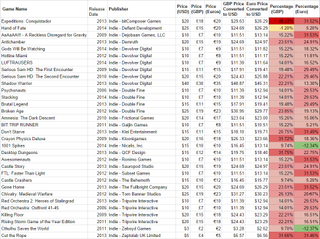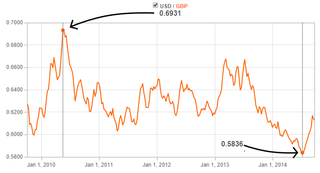
Article by Bo Moore
PC gamers love Steam for its convenience and its mod communities and its vast catalog. But above all, we love it for one thing: prices. Sales. Digital games don't carry the manufacturing and distribution overhead that plague physical discs, bringing prices down in the first place, and Steam Sales slash those prices even further. But there's one area of Steam's purview that's puzzling at best and downright frustrating at worst: how widely, and seemingly unfairly, game prices vary across the globe.
Western Europe just barely trails North America in representation of Steam's 100 million active users, representing 40% and 41% of Steam's global sales, respectively. But prices between these regions can vary with seemingly little consistency, even after accounting for exchange rates between the US Dollar, British Pound Sterling, and Euro. According to SteamPrices.com, there’s a wide swath of games available for significantly cheaper prices in Western Europe. The chief offender on the "top rip-offs" chart: Burnout Paradise: The Ultimate Box, which retails for $19.99 in the US, £4.99 in the UK(~$8.08), and €5.99 in Europe(~$7.54). That's a -60% price discrepancy.
On the other hand, many games are afforded no such price cut in non-US regions. The Sims 3, for example, currently retails at $19.99, £24.99, and €39.99—the UK and Euro prices are $40.59 (+103.05%!) and $51.63 (+158.28%!) when converted to USD, respectively. Similarly, though not nearly as extreme, indie games almost across the board retail slightly more expensively in the UK and EU than their US counterparts.
Indie publisher prices are more consistent than AAA

So why the discrepancy? With digital games, isn't it reasonable to think that prices should be equivalent in different regions? Why does Europe sometimes get games on the cheap, but other times get stuck with a higher price point? And why is everything so fucking cheap in Russia and Brazil?
We tracked prices of both triple-A and indie games across a number of regions, then asked a number of indie publishers about their regional pricing methodology. (We asked some triple-A folks, too, but they weren't as talkative.) Here's what we discovered.
The power of Valve's suggested regional prices
Before the indie explosion of the last five or so years, game prices were determined by mighty publishers wielding extensive market research. We as gamers collectively accepted $60 as the price point for a AAA console game, and the PC equivalent usually followed suit. But as indies have grown in popularity, we now have a much broader array of price points at which games can be sold, and along with them a collective understanding and acceptance of how much content a $5, $10, $15, $20, (and so on) game will contain.
The biggest gaming news, reviews and hardware deals
Keep up to date with the most important stories and the best deals, as picked by the PC Gamer team.
It is through these relatively arbitrary (but not random) personal feelings that most indie games are priced. Representatives from both Devolver Digital (the publisher behind games such as Hotline Miami and LUFTRAUSERS) and Tripwire Interactive (Killing Floor and Red Orchestra) reported that game prices are determined through an open and honest conversation with the developer, discussing what price point they "feel" is right for a game, usually leaning towards a higher price. (You can always lower a price later, but jacking it up after the fact would cause an uproar.)
The next step is determining the price for other regions. When you submit a game to Steam, Valve automatically suggests prices for local currencies in other regions. You have the option to change these numbers at will, but a suggestion is made. It's unclear how exactly these suggested prices are determined—likely a combination of current exchange rates, regional sales trends, and other factors. (Valve did not respond to our request for comment.)
"Valve has sold an awful lot of games," Tripwire Interactive Vice President Alan Wilson told PC Gamer. "Counter-Strike has done huge business across the globe, in every available marketplace, so they must have a metric shit-ton of empirical data. And if I know Valve, they will have experimented with the pricing. They like experimenting, they're willing to take the risk of experimenting to find out what works and what doesn't. So in those markets that we really don't know, I'm perfectly happy to take their suggestion."
Having said that, Wilson says his company does sometimes adjust the suggestions a bit—usually just for the Pound and the Euro. In those cases, they look at the current exchange rate and then ask 'does this feel right?'

Exchange rate fluctuations can affect our view of how "fair" a game's price conversion is.
Assuming this logic is followed, you would assume that prices in the UK and Europe are roughly equivalent to their US counterpart. So then why are indie games—Tripwire, Double Fine, and Devolver Digital all reported this method for regional pricing—consistently more expensive than you would expect?
It boils down to two main factors. One: the price is 'locked in,' so to speak, at the current exchange rate when a game is submitted. In the past five years, the exchange rate between USD and GBP has fluctuated from one US Dollar being worth as much as £0.69 and as little as £0.58. Depending on how the market has changed since the game in question was submitted, its expected price may have changed a fair bit as well, while the price listed on Steam remains unchanged.
(It should be noted that prices can be updated at any time, in any region, but to manually update the price with every little exchange rate fluctuation would be both needlessly tedious and create an awkward situation where players might start trying to game the system waiting for exchange rates to change.)
The answer lies in the second factor: VAT, or Value-Added Tax. European storefront prices—in this case, a price listed on Steam—include VAT, the European equivalent of sales tax. So while Americans (those not in Washington, at least—it's the only state that taxes digital goods on Steam) can pick up Gods Will Be Watching for a buck thirty or so cheaper, they can hardly fault Valve or Devolver for the UK/European Union wanting their cut.
PC Gamer is the global authority on PC games—starting in 1993 with the magazine, and then in 2010 with this website you're currently reading. We have writers across the US, Canada, UK and Australia, who you can read about here.
Most Popular


